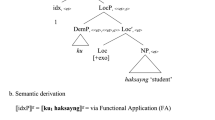Abstract
The article discusses the relevance of the syntactical implications of the absolutive ending (lyabanta) in interpreting the Madhyamaka term upādāyaprajñapti, and hence Mūlamadhyamakakārikā 18.24. The views of both Sanskrit and Pāli classical grammarians are taken into account, and a comparison is made between some contemporary English translations of MMK 18.24 as against Candrakīrti’s commentary. The conclusion suggests that Candrakīrti is grammatically accurate and perceptive, that he may have been aware of the tradition of Candragomin’s grammar, and that the structural analogy between upādāyaprajñapti and pratītyasamutpāda may be relevant in understanding the relationship between notional and existential dependence.
Similar content being viewed by others
References
Berger, D. (2010). Acquiring emptiness: Interpreting Nāgārjuna’s MMK XXIV:18. Philosophy East and West, 60 (1) (2010), 40–64.
Cakravarti, S.C. (ed.) (1918) The Bhāṣāvr̥tti. Varendra Research Society, Rajshahi
Cardona G. (1976) Subject in Sanskrit. In: Verma M.K. (ed.) The notion of subject in South Asian Languages. University of Wisconsin, Madison
Chatterji, K.C. (ed.) (1953) Cāndravyākaraṇa of Candragomin (Part I). Deccan College, Poona
De La Vallée Poussin, L. (ed.) (1913) Mūlamadhyamakakārikās de Nāgārjuna avec la Prasannapadā Commentaire de Candrakīrti. Académie Impériale des Sciences, St. Petersbourg
Dwarikadass, S. (ed.) (1981) Abhidharmakośa. Bauddha Bharati, Varanasi
Feer, L. (Ed.).(1890/1975) Saṃyutta-nikāya, part III, Khandha-vagga. London: PTS.
Garfield, J. L. (1995). The fundamental wisdom of the middle way. New york oxford university press.
Jamchen Namdol Ā (1997) Ācāryanāgārjunapraṇīta Pratītyasamutpādahr̥daya evaṁ Āryadharmadhātugarbhavivaraṇa. Central Institute for Higher Tibetan Studies, Sarnath
Kalupahana D.J. (1986) Nāgārjuna: The philosophy of the middle way: The Mūlamadhyamakakārikā of Nagarjuna (p. 339.). State University of New York Press, New York
Kudo, N. (ed.) (2004) The Karmavibhaṅga. IRIAB, Soka University, Tokyo
Lhalungpa, L. P. (Ed.).(1970). In L. P. Lhalungpa (Ed.), Dbu ma Rigs Tshogs drug: The six Yukti Shastra of Madhyamika. Delhi: (p. 1–37 include the MMK)
Lindtner C. (1982) Nagarjuniana: Studies in the writings and philosophy of Nagarjuna. Institut for indisk filologi, Copenhagen
Oetke C. (2007) On MMK 24.18. Jounral of Indian Philosohy 35: 1–32
Pradhan, P. (ed.) (1950) Abhidharmasamuccaya. Visva-Bharati, Calcutta
Rao, B.M.R. (ed.) (1927) The Rūpāvatāra of Dharmakīrti. G.A. Natesan & Co, Madras
Takasaki, J.(1988). On Upādāna/Upādāyaprajñapti. In Orientalia Iosephi Tucci Memoriae Dicata (pp. 1451–1464). Rome: ISMEO.
Tripāṭhī, J. S. L. & Malaviya, S. (Eds.).(1984). Kāśkā of Vāmana and Jayāditya with Nyāsa or Vivaraṇapañjikā of Jinendrabuddhi and Padamañjarī of Haradatta Miśra with Bhāvabodhinī Hindi Exposition by Dr.Jaya Shankar Lal Tripathi. Vārāṇāsī: Tara Printing Works.
Vaidya, P.L. (ed.) (1961) Mahāyānasūtrasaṁgrahaḥ. Mithila Insitute, Darbhanga
Vasu, S. C. (Ed. and Trans.).(1982). The Siddhāntakaumudī of Bhaṭṭoji Dīkṣita (vol. 2, part 2, p. 383). Delhi: Motilal Banarsidass.
Waldschmidt, E. (Ed. and Trans.).(1957) Das Catuṣpariṣatsūtra. Berlin: Akademie-Verlag.
Woodward, F. L. (Ed.). Sārattha-ppakāsinī, Buddhaghosa’s commentary on the Samyutta-nikāya, vol. II, on Nidāna-vagga, Khandha-vagga, Sal̥āyatana-vagga (First Part). London: PTS, 1977 (19321).
Xuezhu, L., Steinkellner, E. (eds) (2008) Vasubandhu’s Pañcaskandhaka. Austrian Academy of Science Press, China Tibetology Publishing House
Author information
Authors and Affiliations
Corresponding author
Rights and permissions
About this article
Cite this article
Salvini, M. Upādāyaprajñaptiḥ and the Meaning of Absolutives: Grammar and Syntax in the Interpretation of Madhyamaka. J Indian Philos 39, 229–244 (2011). https://doi.org/10.1007/s10781-010-9121-9
Published:
Issue Date:
DOI: https://doi.org/10.1007/s10781-010-9121-9



